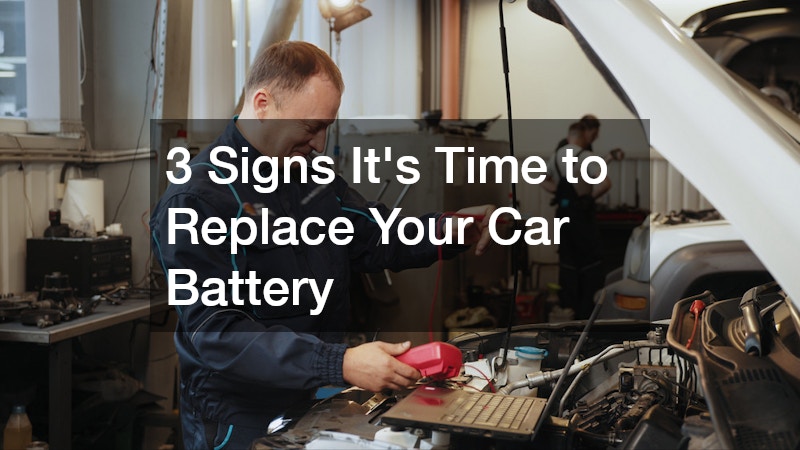
The car battery is an essential component of your vehicle, powering everything from your ignition system to the electronic devices you use daily. It's not just a simple power source but the heart that provides life to your vehicle's electrical system. However, as with any component, car batteries eventually wear out and need replacing.
Video Source
Recognizing the signs of a failing battery can save you from inconvenience or unexpected breakdowns. Let's explore three unmistakable indicators that it's time to replace your car battery.
One of the initial signs that your car battery may be nearing the end of its life is a slow engine crank. This noticeable delay in starting your engine is a clear indication that the battery is losing its charge-holding capacity. As the battery weakens, it struggles to supply the necessary power to turn the starter motor. You might notice a sluggish, whirring sound when you turn the key, which usually becomes more pronounced in colder weather. If you consistently experience a slow engine crank, it's time to have your car battery tested and potentially replaced.
Cold weather can particularly exacerbate this issue, as batteries tend to lose a significant portion of their capacity at low temperatures. In fact, a fully charged battery at 0°F has only about half of its starting power available as it would at 80°F. If you live in a region with harsh winters, this symptom becomes even more critical. Not only does a slow crank signal a weakened battery, but it can also indicate potential problems with the alternator or other electrical components. Therefore, addressing a slow engine crank is paramount to ensure broader electrical system health.
Ignoring this symptom might lead to inconvenient situations where your car doesn't start, leaving you stranded. It's not just about the inconvenience; constantly drawing from a weakened battery can place unnecessary strain on your vehicle's electrical system. As a preventive measure, it's advisable to perform regular battery inspections, especially before the winter season. Finding yourself in a non-starting situation could spoil your plans or even affect your routine. Thus, timely identification of a slow engine crank can save you from future headaches.
Another significant indicator that your car battery is in decline is dimmer headlights. Since the battery powers your vehicle's lights, a weaker battery will not provide enough electrical current for optimal brightness. You might also notice your dashboard lights dimming, especially when the car engine is not running. The consistency and intensity of your vehicle's lights can be a reliable measure of battery health. If you frequently experience these dimming issues, it might be due to a failing car battery unable to sustain necessary power levels.
Electrical features such as power windows, seats, and other accessories may also become sluggish or unresponsive. This decline in performance is because each of these components relies on the car battery to function efficiently. If you observe that your car's electrical accessories are not operating as smoothly as they once did, it might be time for an inspection. Even though alternator issues could also be responsible, a failing battery is often the primary suspect. Regularly testing your battery's charge-holding capacity can help confirm whether it is causing these issues.
Dim headlights and electrical malfunctions can compromise driving safety and comfort. Night-time driving becomes hazardous if your headlights aren't bright enough to illuminate the road effectively. Additionally, using devices like your GPS or charging a phone can further drain an already weak battery. Checking these signs early can prevent potential safety concerns and ensure your vehicle's reliable operation. Timely intervention by replacing the car battery can resolve these issues and restore optimal functionality.
Understanding the age of your car battery can give you a good indication of when replacement might be necessary. Most car batteries have a lifespan ranging from three to five years, depending on usage and climate conditions. If your battery is approaching or has surpassed this time frame, it's a good idea to proactively seek replacement. Corrosion around the battery terminals can also be a telling sign. Corrosion appears as a white, ashy substance around the battery posts and can greatly hamper battery performance.
Corrosion impedes the electrical current flow between the battery and the vehicle's electrical system, leading to poor performance. While cleaning the terminals can temporarily resolve the issue, the recurrence of corrosion is an indicator of battery wear. Furthermore, internal chemical reactions within the battery can produce gas that forms this corrosive build-up. Regular inspection for corrosion and timely intervention through cleaning or replacing the battery can prevent bigger issues. Ignoring these signs can lead to premature battery failure and additional repair costs.
Maintaining a scheduled replacement cycle based on age and condition can prevent many of the issues associated with failing batteries. Aging and corrosion are natural processes, but regular maintenance can mitigate their impact. If you're unsure about your battery's condition, most auto shops offer battery testing services. Checking your battery's condition at regular intervals can alert you to potential issues before they become problematic. Informed and timely decisions about replacing your car battery ensure vehicle reliability and performance.
.